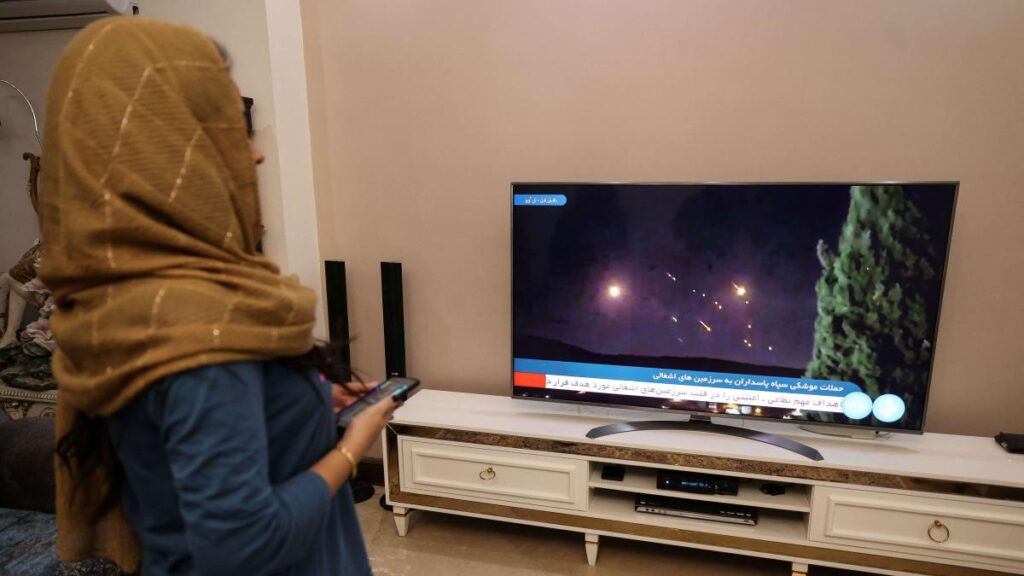Iranians have expressed a mixture of pride, uncertainty and fear since their country launched a large-scale ballistic missile attack on Israel on Tuesday evening.
Within minutes of the attack beginning, Persian social media feeds were filled with shaky videos showing the flashes of the missiles flying overhead.
Iranian state television broadcast images of groups of people cheering in the streets, waving flags and chanting “Death to Israel.”
But the mood online was different, with not everyone expressing support for the attack.
Some shared tense scenes and heated debates about a possible war between the arch-enemies, after keeping their conflict largely in the shadows for decades.
The conflicting responses exposed deep divisions in Iran, where there is widespread dissatisfaction with the clerical establishment and frustration over the economic problems caused by the sanctions.
On one side of the debate are those who support the government’s actions with nationalist pride, while on the other side are those who fear war, economic collapse and further suppression of domestic reform movements.
Iran’s Revolutionary Guards said Tuesday’s rocket attack successfully targeted Israeli military and intelligence bases and was in retaliation for the recent killings of the leaders of its allies Hamas and Hezbollah.
The Israeli military described the attack as “indiscriminate” and said that although it had been largely thwarted by air defenses, it had caused casualties and sent millions of Israelis to bomb shelters.
Israeli Prime Minister Benjamin Netanyahu has warned that Iran will pay for this “major mistake”.
For many supporters of the Iranian government, the attack marked a proud moment of resistance.
“Bravo to (Supreme Leader Ayatollah Ali) Khamenei! Bravo to the Revolutionary Guard!” a young woman shouted in a video that went viral.
Such sentiment frustrated other Iranians online.
“Please distinguish between the people and the Revolutionary Guards; we are under enormous pressure,” a middle-aged man pleaded in a video shared on social media.
Some Iranians believed the strike was an unnecessary provocation that would only make their lives worse.
“We have no choice but to protect our country, but we are the ones who will bear the consequences,” said a concerned resident of the capital Tehran.
In the hours after the attacks, rumors emerged that Israel might respond by targeting Iran’s oil infrastructure, which is a key part of the country’s economy.
Videos soon emerged showing gas stations overwhelmed, with long lines of people rushing to fuel their vehicles, fearing future shortages.
The missile attack has also dimmed hopes for diplomatic progress with the West and other countries in the region.
The election of Masoud Pezeshkian as the new president in July had sparked optimism among moderate views. Some people saw him as a potential bridge in easing regional tensions.
But a Persian BBC viewer complained that “this attack is another step away from diplomacy and one step closer to conflict.”
“I fear that this war could be used as an excuse to intensify the crackdown against those of us who fight for freedom,” said one young activist, referring to the nationwide “Woman, Life, Freedom” protests that took place two years ago outbreaks.
Many worry that a new conflict could not only undermine calls for reform but also give the government the power to further suppress internal dissent.
Unlike previous escalations, this time there is growing fear of a potentially strong retaliatory response from Israel.
And many believe that Israel’s advanced military capabilities could lead to unprecedented destruction if a full-scale war were to break out.
“No one wants war, not the people, not even the officials,” said one commenter on social media.
This sense of vulnerability has made the situation more uncertain than ever before.
Amid rising tensions, some people even called for regime change.
“The only way to save Iran is not through war, but through overthrowing the current regime,” said another Persian BBC News viewer, urging the West to support the Iranians in their fight against the government.
However, many believe that the country’s future should be decided internally, free from any foreign intervention, to avoid the potential chaos that outside interference could cause.

